#Frederick Piper
Photo
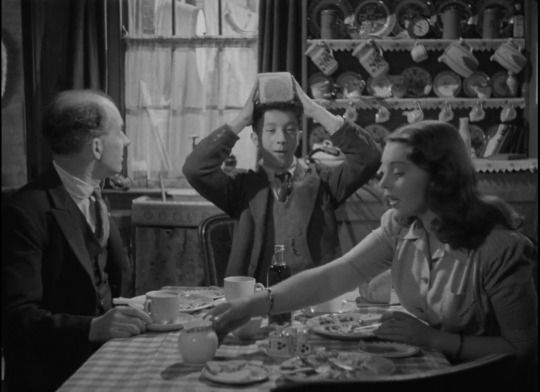

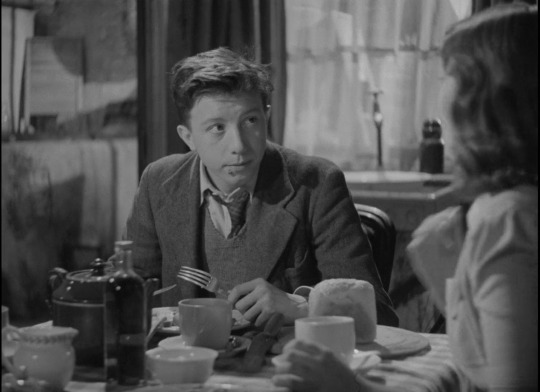
Hue and Cry | Charles Crichton | 1947
Frederick Piper, Harry Fowler, Heather Delaine
9 notes
·
View notes
Text
*the 7 demigods and some of their families at a get together*
tristan mclean: i still don’t love that 3 teenage couples were all on an isolated boat together. for weeks. including you, pipes
piper: don’t worry dad. coach hedge was very strict. there was no funny business allowed
leo: yeah especially after the percy and annabeth scandal. i mean,
you should have seen how much coach yelled when frank found them in the stables the next morning-
annabeth and percy: LEO!!
leo:
piper:
jason:
thalia:
hazel:
tristan:
nico:
frank:
frederick chase:
mrs. chase:
paul:
sally: no please continue. i’d love to hear this
percy: *glares at leo*
leo: *accidentally catches on fire and runs away*
everyone:
frank: i looked away quickly, i swear!
annabeth: YOU DIDNT NEED TO!
percy: YEAH ALL WE DID WAS-
annabeth: PERCY OH MY GODS SHUT UP!
#oh how i amuse myself#sally knows what she’s doing#frederick chase is not as amused#NOTHING HAPPENED WE SWEAR#LOL#no one is believing them#awkward lol#i love it#percy jackson#annabeth chase#jason grace#piper mclean#leo valdez#hazel levesque#frank zhang#heroes of olympus#mark of athena#percy jackson and the olympians#percabeth#pjo#humor#pjo humor#sally jackson#paul blofis#incorrect quotes#pjo incorrect quotes
489 notes
·
View notes
Text
The Mark of Athena except, instead of it being a coin given to Annabeth by Athena/Minerva, it’s a tattoo burned onto her forearm. Hear me out.
The tattoo has a tribal design of an owl, an olive branch, and the Greek letters A.Θ.E on it. And it's carved and burnt onto her skin. It glows red when Annabeth’s alone on her quest, and it would slightly hurt as the red glow would also be burning on her skin. It would look like a regular tattoo on her arm when it’s not glowing.
Their encounter would’ve been like:
Athena grabbed Annabeth’s right arm and dugged her nails onto them causing a burning sensation surging through her arm. “Follow the Mark of Athena,” She said. “Avenge me.”
“Mom…” Annabeth winced in pain as Athena’s nails dugged deeper into her skin. “What are you talking about? What mark?”
Then she saw the mark Athena meant. Her mother was placing the mark on her. On her skin, she saw a drawing of an owl, an olive branch and the greek letters, A.Θ.E. It looked like it was carved and burnt onto her skin.
“Avenge me or leave me.” Athena had said.
Annabeth had to pull herself from her mother’s grasp and ran without looking back.
She had tried scrubbing and washing it off, but to no avail. And ever since that day with Athena/Minerva at Grand Central, she only wore long-sleeved shirts to hide the mark on her forearm, as it would only remind her of her last encounter with her mother.
She didn’t tell anyone about it. Not the Head Counselors, or her siblings, not Jason, Piper, and Leo-her crewmates in the Argo II before sailing for New Rome, and not even Chiron.
Annabeth tugged her shirt's sleeve when Ella the harpy recited the prophecy concerning the Mark of Athena fearing anyone will know about it. Wisdom’s daughter walks alone, the Mark of Athena burns through Rome…
She discovered that the mark on her arm glowed a fiery red while she was at Fort Sumter in Charleston. There was also a mark of Athena that glowed on the walls when she became trap inside a dark room with the mark burning spiders away.
No one else knew about it until Piper asked her what the Mark of Athena was while the seven of them were in a meeting in the Argo II's mess hall. She pulls out her sleeve and shows it to the rest of the seven. Some of them were fascinated by it to the point where Leo says it’s dope and I want one! Others, particularly Hazel and Percy recognizes that it looked like it was burnt on her skin.
After the 2nd Giant War, the tattoo faded and now permanently looked like a wine-stain birthmark after the Athena Parthenos was returned to the Greeks and placed on Half-Blood Hill.
Her Dad, Frederick freaked out when he saw the birthmark-esque tattoo, and her cousin, Magnus basically snorted and said, Your mom placed a mark on you? Oh, my gods, Couz, what did you do?
So, yeah, just a thought. 😊
#percy jackson and the olympians#heroes of olympus#annabeth chase#percy jackson#jason grace#piper mclean#leo valdez#hazel levesque#frank zhang#ella the harpy#the mark of athena#argo 2#argo 2 crew#council of seven#frederick chase#magnus chase
84 notes
·
View notes
Text
Piper: How well do you two know each other's backstories?
Percy: I know that Annabeth has abandonment issues due to her shaky relationship with her father, Frederick Chase and her step-mother, whose first name I don't remember BUT I know she took her husband's last name.
Percy: Annabeth overheard that Athena was completely surprised Frederick with a baby, and he didn't want her at first, but he tries. Annabeth tried to live with him at 10 years old and 12 years old but couldn't keep up with the monsters.
Percy: Mrs. Chase didn't believe Annabeth about spiders when Annabeth was 6 because she didn't know about Annabeth being a demigod. Annabeth ran away because of that.
Percy: I've tried to help by introducing Annabeth to my mom (who is the best person in the world) and Paul Jackson (who is the best step-parent in the world) and we've welcomed her anytime at our home.
Piper: Wow! Thats amazing! 10/10 Boyfriend goals!
Piper: What about you, Annabeth?
Annabeth: Seaweed brain? Hmm. I think he had a step-father who's name was Gabe? Gabe something. Also I think he might've been stinky. Tartarus reminded Percy of him.
Piper:
Piper: *looks at her notes, which list that Gabriel Ugliano used to regularly call Percy brain boy, humiliate him due to his poor grades and learning disabilities, threatened to "punch Percy's lights out" if he ever revealed their 'guy secret', had a gambling addiction that caused Percy to grow up with financial insecurity, used to leave layers of trash in Percy's room while he was away at school (which probably got moldy), and abused Percy's mom so badly that Percy, Sally and Poseidon all decided that Gabe needed to die*
Piper: Is that it?
Annabeth: Yep. Well, I know he was repeatedly kicked out of school like most demigods are, but that's it.
Piper:
Annabeth: Why, did I miss something?
#anti percabeth#percy jackson#pjo#hoo#heroes of olympus#annabeth chase#percy jackson and the olympians#rick riordan#piper mcclean#rrverse#where is the lie lol#percabeth is my villian origin story lol#the formatting is atrocious please forgive me
76 notes
·
View notes
Text
the pjo x bollywood/kollywood AUs I'll never get around to writing:
the om shanti om AU : percy as om, annabeth as shanti, luke as mukesh, sally as om's mom, grover as pappu
the jab we met AU: annabeth as aditya, percy as geet, luke as anshuman
the oh my kadavule AU: percy as arjun, annabeth as anu, grover as mani, rachel as meera
the kabhi khushi kabhi gham AU: annabeth as rahul, percy as anjali, frederick as yash, jason as rohan, piper as poo
the ghilli AU: percy as velu and annabeth as dhanalakshmi, luke as muthupandi
#pjo fandom#percabeth#percy jackson#annabeth chase#bollywood#bollywood au#kollywood#om shanti om#jab we met#k3g#pjo fic#pjo fic ideas#anyone's welcome to write these because I sure as hell never will#also imagining luke as muthupandi going hai chellam is cracking me up#if anyone on Tumblr understands the reference hit me up
32 notes
·
View notes
Note
Sally Ann Jackson, - Daughter of Philotes and Legacy of Fornax.
Frederick Elliott Chase, - son of Enio and legacy of Aediculus.
Beryl Darlene Grace, - daughter of Dionysus and the legacy of Phoebus.
Esperanza Andrea Valdez, - daughter of Hermes and legacy of Spes.
Tristan Haymon McLean, - son of Pothos and legacy of Melpomene.
Marie Elizabeth Levesque, - daughter of Poseidon and legacy of Euphrosyne.
Emilia Alma Zhang, - daughter of Bona Dea and heir of Neptune.
daughter of philotes sally. so real actually. goddess of literal affection that fits her so well so does legacy of fornax. patroness of baker🤌
fredrick being a child of enyo is EHHEHLEVRF yes please and eediculus is also yes it would make so much sense for annabeth to be a legacy of the god of architecture
esperanza being a legacy of spes is :(((((( me when leo is a legacy of hope but he has fucking none of it
tristan 🤝 piper
children of love gods
and theyre so real for it
legacy of poseidon hazel so real tbh. AND LEGACY OF EUPHROSYNE IS ALSO REAL i feel like she could very much fit the goddess of joy
i don't know much about Bona Dea, but i think it fits to be honest :D
#sally jackson#fredrick chase#esperanza valdez#tristin mclean#marie levesque#emilia zhang#percy jackson#annabeth chase#leo valdez#piper mclean#hazel levesque#frank zhang#pjo#phoenix answers
13 notes
·
View notes
Note
8, 12, 16, 18, 24
choose violence ask game (send me more pls!)
8. common fandom opinion that everyone is wrong about
the two obvious answers are a) frederick chase is awful and b) luke is a creep, but since those are too mainstream, may i also submit c) the nico outing scene was problematique. the nico outing scene was Good actually. drama and conflict are like. necessary in fiction
12. the unpopular character that you actually like and why more people should like them
okay granted this is just because i've decided to stuff him with all sorts of delightful insanities that have very little bearing in canon, but i'm blorbofying the shit out of octavian
16. you can't understand why so many people like this thing (characterization, trope, headcanon, etc)
academic annabeth is a lie. she is smart but she's awful at school. i beg you all, free yourselves from the hermione granger industrial complex! and runner up, punk!percy/girly!annabeth is all wrong; it should be punk!annabeth/preppy!percy. i'm right and i'm not taking any arguments
18. it's absolutely criminal that the fandom has been sleeping on...
ANNABETH AND CLARISSE FRIENDSHIP. i adore piper and annabeth but probably at least 40% of the time if annabeth has a childhood best girlfriend it should be CLARISSE
24. topic that brings up the most rancid discourse
the casting discourse. i am spraying you all with weed killer. shut the fuck up
17 notes
·
View notes
Text
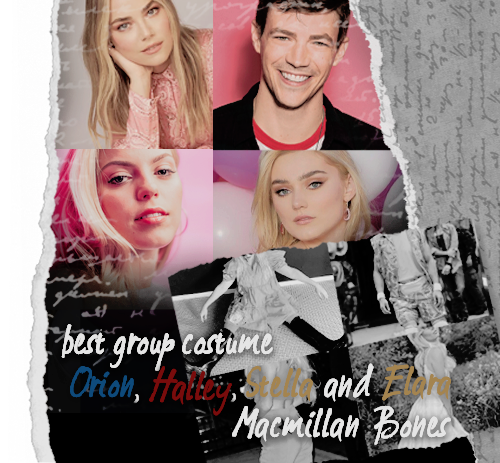
halloween costume contest ‘27 → orion, halley, stella & elara macmillan-bones for best platonic couples/group costume
well aren't you pretty in pink? a family that costumes together stays winning it seems. you all committed to the theme, which is no surprise given your track record. but we've got to say that the production value of this year's costume was a vast improvement to last year's. congrats on your win, barbies and ken !!
2nd place - Augusta, Magnolia & Willow Picquery
3rd place - Frederick Hayes, Vera McKinnon, Freya MacDougal & Damien Launier
the rest of the runner ups are below !!
Alastair & Charlotte Watson
April & Isla Marchant
Axel Wolffe & Mason Jones
Cameron Coleman & Ciara Garcia
Iris Lestrange & Lyra Malfoy
James Ashcroft & Frank Longbottom II
Lucy Weasley & Nate Wood
Maeve Finch & Trinity Trelawney
Merle Rappaport & Piper Wilkinson
Octavia Coleman & Erin McCormack
Rory Goldstein & Evangeline Pickering
Tristan & Betty Connolly
#orion macmillan bones#stella macmillan bones#halley macmillan bones#elara macmillan bones#halloween#halloween 27
10 notes
·
View notes
Text
Owlcatober Day 19 - relaxing
Piper and Daeran spend some time relaxing and indulging in their favorite, most hated hobby.
also on ao3
Daeran sweeps into the library with a book in his hand and a long-suffering expression on his face. He sighs deeply as he settles down in a plush armchair with the air of a man steeling himself for some utterly dreadful yet vitally important task.
“I must say,” he proclaims without preamble, “this last gauntlet has been one of the most grueling things we’ve faced thus far. Please tell me you’ve provided enough wine to drive the memory from my mind?”
Piper is already reclined on the long chaise she’d dragged into the library specifically for the purpose of these meetings. Her shoes lay discarded on the floor, and her legs dangle off the edge of the armrest as she lies with her own book propped up on her stomach. With one hand, she flips through the book’s pages, while the other holds a glass of rich, sweet wine.
“Help yourself,” she says, gesturing to the bottle on a nearby table. “Heaven knows we need it. The first time around was painful enough, but the follow-up…”
“Oh, it’s ludicrous!” Daeran begins immediately. He wastes no time in filling his glass to the brim with wine and takes a long drink before continuing his tirade. “From the very start- after all the trouble Frederick’s affair caused him in the first novel, he starts off this one by trying to legitimize the bastard? What an absolute fool.”
“And a rubbish king, to boot,” Piper comments, taking a sip of her own wine. “Without Mariella, absolutely nothing would get done. I’m glad she at least got to have an affair of her own in this one, even if she did have to kill the fellow in the end.”
“Let’s not forget to credit Katyana, as well. She had a better head on her shoulders than either of them, even whilst being poisoned. Although I must say, I do wish she would stop trying to exile Princess Celine. I quite like her.”
“The hedonistic noblewoman who tries to seduce half the court? I’m shocked,” Piper comments wryly.
“Are you trying to claim you don’t feel the same?”
“Not at all- she was a delight. I was pleasantly surprisedby Lady Georgette in this one, too- you owe me ten gold, by the way, seeing as she married the rich baron and not the soldier.”
Daeran scowls over his wine. “That marriage barely lasted a fortnight!”
“It still counts, and a bet and is a bet. Though even I couldn’t have predicted that she would end up as the madame of a brothel. Quite the career change, and I must say- I do like it for her. I think she’ll do well for herself.”
Her words are rather suitably punctuated by the jingle of gold as Daeran sourly empties his coinpurse, but he pauses before handing them over. “How about another wager, instead? Lady Lenore and her new lover Lord Nysus…do you think they shall wed?”
Piper nearly spills her wine as she jolts up in indignation. “I should hope not! She may be insufferable, but she can do better than him.”
A grin creeps onto Daeran’s face, and he subtly tucks his gold away once again. “Oh, I don’t know…he has some intriguing qualities. Didn’t you read Chapter Eight?”
“The one where he watches her take a bath?” Piper shakes her head emphatically. “I nearly fell asleep. Even Mariella and Frederick had more chemistry than that!”
Daeran leans forward as she speaks, smiling quite evilly over his wine. Piper knows what he’s after, and she knows she should probably take her winnings and leave it…but as a storyteller herself, this is a matter of pride. With a huff, she says, “Fine. Fifteen gold that by the end of the third novel, Lenore has kicked Nysus out of her bed. And her bathtub.”
“Deal,” Daeran says nodding firmly. “I, for one, am looking forward to more of this Nysus. I do so appreciate a classic scoundrel, and if I am forced to read this drivel then I am determined to find my enjoyment wherever I can.”
Piper rolls her eyes as she settles back against the chaise. “You’ve your own free will. Nobody is forcing you to read anything.”
“But what else am I to do?” The protest is rather dramatic, in Piper’s opinion, but Daeran shows no sign of relenting. “Go on with my life, never knowing the fate of our Frederick and Mariella? Unthinkable. You have put me in the most odious of traps. I’m doomed to a lifetime of overblown prose and monologues of devotion for the foreseeable future.”
“If it makes you feel any better,” Piper says, turning back to the book in her lap, “their fates aren’t looking very bright, now that Katyana has defected to Cheliax.”
Daeran points an accusing finger at Piper, the wine sloshing in his glass. “Not another word! How many times must I say- these nights are for discussion, not reading ahead.”
“Fine, fine.” Piper puts her book to the side and props her chin in her hands, her eyes glinting. “Can we discuss how Lady Georgette is definitely going to sleep with that pirate soon?”
By the time the wine is finished- both the initial bottle and the second they procured from the kitchens- Piper and Daeran have thoroughly bemoaned every relationship set forth in the novel, and have placed three more bets as to their outcomes.
An absolute waste of evening, Piper knows. She’s looking forward to the next one.
(yes, all referenced plot points come from a real show, one which my sister binged a while back and which i was forced to learn about through association. congrats (?) to anyone who recognizes the source material!)
9 notes
·
View notes
Note
"But I do understand that my view is not the most common one" Do you understand why it isn't common though? Have you discussed with artists of any kind? It's a prime example of a theoretical view that holds no water in reality because it's so intrinsically opposed to the nature of human artistry and an artist's emotional ownership of the art they create.
Yes - I do know why it's not common, because we live in a capitalist society and part of the way that capitalism is justified is the 'great man' theory. Ideas, art, politics, are portrayed as the work of a single great individual, rather than the collective work of many people together.
In art that means that only some people who are involved in a work of art are allowed to have emotional (or any other form of) ownership of the art that they create. A costumer designer on a movie can create incredible art - but their emotional ownership is not acknowledged - and the art is considered the work of a director. A session drummer can create something incredible and beautiful - and not have any of their emotional or legal ownership acknowledged.
The idea that in a work of art created by many, many people, it is one or two people with one or two roles, that there are handful or roles (director, fashion designer, producer, architect) who get to both control the work of art and whose artistry is acknowledged - is a capitalist idea. (There is also so much to say about how both the roles which are acknowledged to have artistic legitimacy and control were the roles performed by people with power in society - and also how access to those roles has been incredibly controlled and limited to certain types of people - the film industry is particularly interesting on that question).
My rejecting the idea of the great man theory of art - is part of a wider rejection of capitalism. I don't think that it's right that employers own workers' labour in factories or offices. I don't think that same process where people with power get to have control of other people's work is legitimate if you call it art.
I find it really grim, that you don't even know that there are other ways of doing it. That there have always been artists who have rejected this model and experimented with alternatives and whose art was about understanding and changing a world that had such a limited vision of whose creative work was art.
So I'll end with a poem, by an artist who rejected the model of art that you see as instrinsically part of the nature of human artistry.
A Worker Reads History
Bertolt Brecht
Who built the seven gates of Thebes?
The books are filled with names of kings.
Was it the kings who hauled the craggy blocks of stone?
And Babylon, so many times destroyed.
Who built the city up each time? In which of Lima's houses,
That city glittering with gold, lived those who built it?
In the evening when the Chinese wall was finished
Where did the masons go? Imperial Rome
Is full of arcs of triumph. Who reared them up? Over whom
Did the Caesars triumph? Byzantium lives in song.
Were all her dwellings palaces? And even in Atlantis of the legend
The night the seas rushed in,
The drowning men still bellowed for their slaves.
Young Alexander conquered India.
He alone?
Caesar beat the Gauls.
Was there not even a cook in his army?
Phillip of Spain wept as his fleet
was sunk and destroyed. Were there no other tears?
Frederick the Great triumphed in the Seven Years War.
Who triumphed with him?
Each page a victory
At whose expense the victory ball?
Every ten years a great man,
Who paid the piper?
So many particulars.
So many questions.
#I don't think leaks#are the best starting point for this sort of discussion#and I didn't do a very good job of setting it up#but I am always glad to talk about this
10 notes
·
View notes
Text
Pan of the Infinite Realms
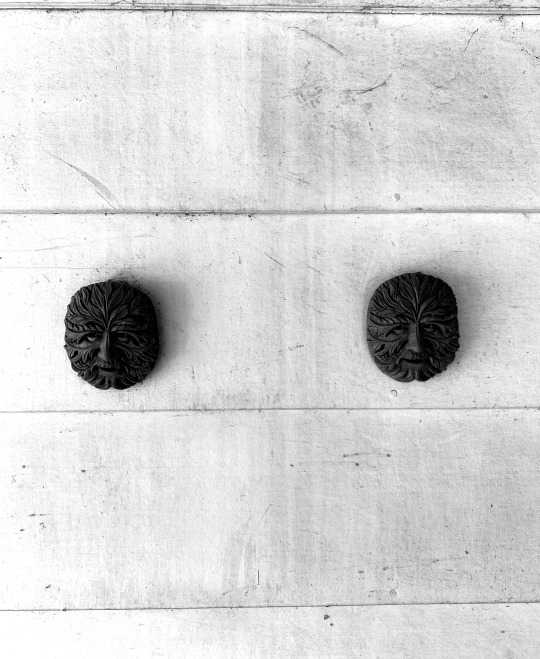
To sing in mourning: bittersweet.
Occasionally during these weeks following his passing, I have found myself struck, in contemplation of the father as mythical being, by the image of Pan, rustic God of the wild, goat-horned satyr, famed piper and, by all accounts, general mischief-maker. In spite of Pan’s status as an outcast from the snowy-peaked heights of Mount Olympus—a figure who categorically refused the pomp and grandeur of Zeus’ impetuous brood—the wild God’s unimposing presence was epic, even if only for its tacit reach. There’s something of Pan in the attention to proximity: of being aware of the boundaries between self and those in orbit that plays out through this self-distancing, a recurring displacement of the shapeshifter as he moves along the parallax gap between a retreat into ostracism and the act of caring from afar. Pan: everything, anything, and perhaps especially all those things you hadn’t altogether noticed. Frederick, my father, was, to me, the epitome of the unspoken imperative, quite in contrast to the loud souls surrounding those types of men I’d observe who couldn’t keep their words, their habits or their worldviews contained.
Frederick was never loud, in my recollection. There was a song-like cadence to the inflection of his words, even in those rare instances when he’d engage his booming voice—for there are times when, no matter the family dynamic, the semblances of a father’s authority is demanded. When he spoke, it would often border on the mumble, such that one was inclined to strain in order to hear the words being said. To the uninitiated, this might have seemed the behaviour of the anxiously unsure: of one whose emotions had gone cold, held back and kept tight under guard. It’s true that Fred was not loud in his emotions or his moods, but he showed his love for family and community through his actions. He was generous in his attention, even if it only ever emerged from the outliers. He’d always ask how you were getting on, always eager to hear what you’d been up to, and especially what you thought about the secret whispers of existence or the ways you navigated the various folds of the space-time continuum. His presence, though soft, or at least one that was registered only with a deceptively light touch, became important for those of us who knew the value of having someone to watch over the situation with careful and sympathetic eyes. Someone who made the effort to see you.
Pan was said to be the ugliest God. Well, I think I’ll let that specific part of the constellation skip over into incoherence, unless I wish also to implicate myself and my dear siblings, my fellow autochtha, in this charge of unsightliness. But I can say that there was perhaps some evidence of an aversion to beauty as an ultimate value in Fred, if by ‘beauty’ we mean the type embodied by magazine spreads or movie screens. And if ‘aversion’ is too strong a term here, perhaps ‘indifference’ will do more aptly. In their wedding photos, both Frederick and Veronica (who, among many other things is the mother of his children) look stunning, so it’s not as if he couldn’t lean into, or be swayed, by the gravity of the aesthetic. But in his later years, and personally, for me, in his most handsome of forms, Fred would let his face grow wild until his big bushy beard would catch crumbs. He’d eat heartily without regard to the shape of his tummy. He’d sometimes let the cobwebs grow and the ‘bits’ on the carpet meander at his apartment in Parramatta. When I helped Veronica clean his cottage late ‘22, when he’d been admitted to Campbelltown hospital with the double threat of a UTI and Covid-19, I marvelled at the community of spiders he’d left prospering on his top window by the front door (which was actually his side door, but that's a longer story).
Pan was a much loved piper. I remember how special I felt to be a part of the band at Sadlier at our little church close to our home in Ashcroft and the school I attended. Well to be honest, just between you and me, I wasn’t really part of the band per se, I was really just sitting at the back with the rest of the band, singing along. But I’d go to the rehearsals each week where at least a couple of siblings would be strumming guitars and Fred would play flighty green melodies on his flute. And as far as Fred was concerned, I was part of the band, same as anyone.
In his image, I’m reminded of talk about the fruit freshest from the vine. By which I think I mean to say that even in his advanced age there was something young and carefree to his presence. Being the youngest, I made a particular point of contrast with the oldest member of the family, even if only in our respective ages. I think there was something in me that embodied the audacity and recklessness of youth: the freedom to take the fool’s role and the rebel's cause. It may just be my imagination but I always felt that Fred appreciated my sense of mischief, and perhaps encouraged it to a degree, if not outright endorsing. I mean, he’d never tell directly if he did. Fred was 38 years old when I was born so I never had the pleasure of knowing him as a younger man. In many of the photos we have of his earlier life I notice how broadly he used to smile. When I look at these photos I imagine in the moments of their taking, he’d felt a sense of self-purpose and that he had faith, either in himself or something beyond to which he was connected, and that he held the ideas he brought into the world passionately, close to his heart. As his youngest child I can only smile in the hopes that I can continue this legacy. That we all can.
The man I knew may not have smiled as openly or as vigorously—or at least not for those pointing cameras at him—but humour was never far from his grasp, his bag of tricks always ready at hand. His impish joy would shine brightest in those moments when you were the only one to catch his underhanded joke over the busy dinner table, and he’d smile just as broadly when you passed the same joke back to him ten minutes later. Even once his health began to slide, over these past few years, he was never despondent, never faithless. He was the type who'd crack jokes to the nurses as he limped, blood trickling down his face, and looking as if he’d just barely scraped through a minefield.
Various stories abound regarding Pan’s ancestry and progeny. Some place him as the son of Hermes, others that he was the foster-brother of Zeus, and thus Hermes’ uncle and teacher in music. Other tales have him being older than Zeus, a son of Cronus and Rhea. It’s hard not to think, in this tangle of identity, of those generational traits and recurring faces that are familiar to any who are part of a family tree that takes particular stock of their ancestors’ tales, and holds them close. In this sense, Pan becomes something quite personal, taking on a specific form and imbued with a particular emotional intensity.
Pan, to me, is the spirit of a quiet, smiling face or a particular high-pitched tenor to the questioning voice. Or sometimes he’s a mood: a restlessness that borders on nervousness which, in the end, drifts towards the gentle silence that can emerge between careful minds. He's an inclination to pull the brightest light close to the soul in order to reflect, but not close enough to hinder its flight-path. An idea that comes to you as if from nowhere, before realising that even all of those sweet secret moments in which the ‘self’ reveals its ‘self’ had been, in part, passed down to you along the river's flow. Pan is everything, the interdimensional Möbius loop as well as the tangled mess of phone cords you keep in an old drawer.
In Plutarch, a story related by the historian Philip, tells of Thamus, an Egyptian sailor bound for Rome who had heard a divine voice proclaim that “the great god Pan is dead!” In his compendium, The Greek Myths, Robert Graves writes that Pausanias, while touring Greece roughly a century after this declaration was recorded, had “found Pan’s shrines, altars, sacred caves, and sacred mountains still much frequented.” Perhaps it’s only in this way that we know the value of the wild: once it has been all-but purged from our hyper-aware state of self consciousness.
Perhaps the death of Pan struck such a chord to those in this time of Thamus because it was more than the story of the death of a God, it was also the death of a way of thinking about ‘The Gods,’ which over aeons had shifted, from the rustic ideals of nature as life-giving, passed down through our various oral, aural and psychical transmissions had mutated into the icons of those grandiloquent beings that stood beyond reach as if looking down in judgement from above. If a God could die, it meant that the Gods were like us after all. Let them die to let them live. Let us honour the Gods as being like us, rather than placing them on a pedestal of worship. In this, Pan was perhaps closer to Gaia and Hades than he ever was to the self-assured Zeus. Not transcendental—in the sky—but of the earth below.
I’m not going to pretend that Frederick had any particular inclination towards the Greek gods, or at least he ever shared it with me if he did. He was more into the druidic mysteries and his runes, the teachings of the elders of the Navaho, and the stories of the carpenter of Nazareth than he was in the usual classical fare of ancient history as conceived in ‘the West.’ As such, I should point out that this is in part my picture that I paint over the outline of the father, in the hopes that he won’t mind too much me placing him there, and in fact might find himself at home with the figure of Pan who I have come to love and respect, two archetypes blending.
For the love of the father, his kindness and his gentleness and all of the ways that he shined in his own way I offer three silent cries to the dead God: Pan of the infinite realms. Long may you return to us, and especially in those moments in which we forget what we’ve forgotten.
2 notes
·
View notes
Text
old-fashioned english names for fictional characters
light emphasis on old-fashioned, as some of these first names are slowly becoming more popular.

feminine
amelia
audrey
genevieve
claire
madeline
evangeline
florence
violet
diana
penelope
isabelle
adelaide
maisie
regina
ramona
cornelia
eve
cora
lilliana
bernadette
octavia

masculine
samuel
william
atticus
demetri
leonard
benjamin
alexander
claude
finnian
lincoln
frederick
sebastian
theodore
alaric
alistair
ivan
colin
thomas
nathaniel
felix

neutral
connie
darcy
ezra
cameron
jordan
bailey
robin
kendall
lonnie
piper
addison
emerson
james
jude

surnames
booker
harrington
montgomery
wakefield
boone
sutcliffe
butterworth
gilbert
alderidge
mccoy
harris
forrest
winters
sanders
ivers
evans
abbott
darlington
kingswood
seagrove

#name list#writer#characters#character#fictional#fic#writing#oc#own character#list#character name#character names#english names
147 notes
·
View notes
Photo
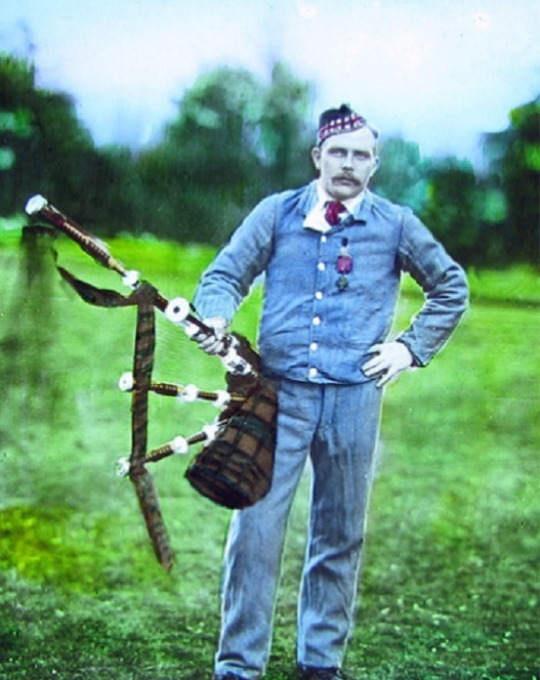

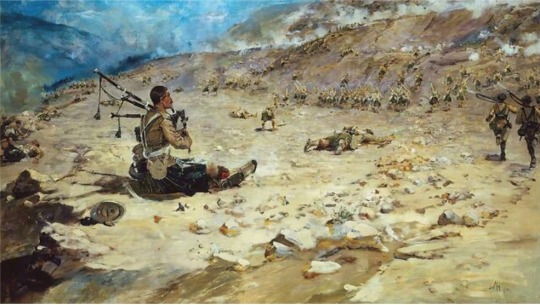
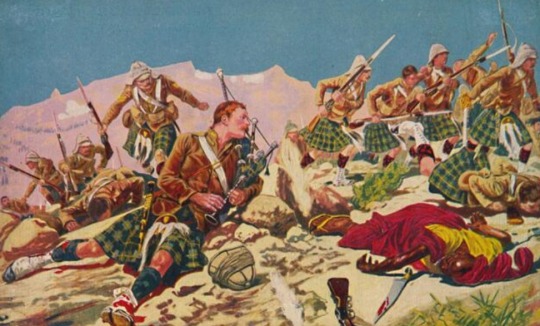

George Frederick Findlater was born on 15th February 1872 at Turriff, Aberdeenshire.
George Findlater, went on to be awarded a V.C for his action during the Tirah campaign, an expedition into the mountains to secure the Khyber pass and the northern approaches to India.
Findlater attended the school in Turriff but left at a young age to work as a farm labourer; back then children were permitted to leave school at thirteen. Two months after his sixteenth birthday, on 7th April 1888, he travelled to Aberdeen and enlisted in the 2nd Battalion, Gordon Highlanders and was sent out to Ceylon.
He transferred to the 1st Battalion for a more active military career on the North-West Frontier. He was a private when the battalion stormed the hills at Malakand. His boot was hit but he was unhurt. In Dec 1896 he became a piper and as such was part of the Tinah Field Force in 1897.
At Dargai he was one of 5 pipers in the “Gordons.” The pipe-major was unable to continue after being hit in the chest. During the action Findlater claimed that he did not hear the order to play Cock o’ the North which is a marching tune. He chose to play a quick strathspey, The Haughs of Cromdales which he thought more suitable. He felt sick with pain after he was shot whilst three-quarters of the way across an exposed strip of land. He fell and, leaning against a rock, continued to play his pipes as blood ran from his wounds.
He became a bit of a celebrity when the Gordons returned home and received his VC in May 1898 retiring from the army soon afterwards. His citation reads:
‘During the attack on the Dargai Heights on 20 October 1897, Piper Findlater, after being shot through both feet and unable to stand, sat up, under a heavy fire, playing the Regimental March to encourage the charge of the Gordon Highlanders.’
He received many requests to perform in public. The War Office were scandalised that he was having to augment his meagre pension by taking money for performances. At the Alhambra Theatre he received £100 a week, but soldiers were barred from attending. In that year, 1898, he was involved in a lawsuit for breach of promise and the audiences began to turn on him. So he left the country for a while and toured North America.
In 1899 he returned home and married Nellie. He set them up with a farm in Banffshire and had 5 children. When the First World War broke out he re-enlisted and was appointed pipe-major in the 9th Battalion. But due to ill health he had to retire in 1915. He spent the rest of his life as a farmer and died in 1947 aged 70.
The medals George Findlater won and his pipes are on display at The Gordon Highlanders Museum Aberdeen.
You can read the full version of the story of this brave man here http://www.findlater.org.uk/Piper.htm
14 notes
·
View notes
Photo

Art in the Mind
[First Printing]
description: Exhibition catalogue published in conjunction with show held at the Allen Art Museum, Oberlin College, Ohio, April 17 - May 12, 1970. Introduction by Athena T. Spear. Artists include Vito Acconci, Siah Armajani, Michael Asher, John Baldessari, Robert Barry, Frederick Barthelme, Bill Beckley, Mel Bochner, Jonathan Borofsky, George Brecht, Victor Burgin, Donald Burgy, Ian Burn, Scott Burton, James Lee Byars, Luis Camnitzer, Rosemarie Castoro, Don Celender, Fred Cornell Cone, Christpher Cook, Eduardo Costa, Robert Cumming, Roger Cutforth, Royce Dendler, David Dunlap, David Eisler, Robert Feke, Rafael Ferrer, George Gladstone, Dan Graham, Ira Joel Haber, Richards Jarden, On Kawara, Michael Kirby, Paul Kos, Joseph Kosuth, R. Rexinger Lau, Barry Le Va, Les Levine, Gleen Lewis, Sol LeWitt, Martin Maloney, Bruce McLean, Bruce Nauman, N.E. Thing Co., Ltd., Claes Oldenburg, Saul Ostrow, Paul Pechter, John Perreault, Adrian Piper, Mel Ramsden, Glen Rea, Allen Ruppersberg, Thomas Duncan Shannon, Society for Theoretical Art and Analyses, Marjorie Strider, John Van Saun, Bernar Venet, Jeffrey Wall, William Wegman, Hannah Weiner, Lawrence Weiner, and David Nelson. Includes a range of documents, from drawings and sketches to writing and project proposals and outlines. In black-and-white.
Allen Art Museum, Oberlin College, 1970
43 notes
·
View notes
Text
while i continue to work on these replies , hmu / like this if you want some threads w frederick , hallie , marcus , heath , verena , bex , richie , dex , anwar , lexi , jude , quentin , bridget , piper , ryland , yasemine & / or maggie cuz my muse for them is through the roof ♡
2 notes
·
View notes
Photo

In this festive season, enjoy this review of the Hull Little Theatre’s 1927 Christmas play, featuring Colin Clive in several roles quite different from those he would become famous for playing. From the Hull Daily Mail, published December 27, 1927. Transcript follows; apologies for the long text post but the article is very difficult to read in the clipping.
Feast of Fun and Fancy
“A Christmas Party” at the Little Theatre
All that a child could dream about the festive season is incorporated into “A Christmas Party,” which was produced at the Little Theatre, Hull, on Christmas Eve for a fortnight’s run. It is a charming show, brilliantly produced, and the work attached to the preparation of its innumerable delights must have been enormous. From the kiddies’ point of view the whole conception of the piece gives unalloyed delight, while the adult spectators will derive interested pleasure in watching the versatile efforts of artists usually associated with dark tragedy or subtle comedy. Personally, I found the show a thoroughly delightful entertainment, and the revival of the old Harlequinade (played by Colin Clive as Joey and Frederick Piper as Pantaloon) was a particular cause for enjoyment. The two actors, who emerged from a giant Christmas cracker, clowned their way through the second half of the programme with rare style, and their patter song about the Little Theater personalities was remarkably clever.
Contrary to custom this Christman party is not a pre-arranged one. It is the sudden thought of two children--Christopher and Evangeline--who are confined to their room with an attack of measles. Unable to join in the round of festivities themselves, they invite Santa Claus and the inhabitants of the toy cupboard to an impromptu party, and the result is absolutely amazing. Father Christmas makes a dramatic entry, in traditional fashion, and then the fun begins, waxing “furioser and furioser,” until it is time for everyone to go home. Patricia Bradfield, the clever young actress who was such a “hit” last season, makes a welcome return to play the part of Evangeline, while Merle Tottenham, another capable artist, acts skilfuly as the little boy. They sing and dance with charm, and their work has the requisite ingenuousness. As the host and hostess, they have a lot to do, particularly at the brilliantly arranged supper table, when the dolls become somewhat peevish and the Golliwog finds the lemonade going to his head. Father Christmas, splendidly played by Richard Fisher, also has to help to keep matters smooth.
Many of the people appeared in several characters. Edith Sharpe was a good-humoured, but garrulous Irish nurse, and a bold Robin Hood, and her songs were warmly applauded. As Anthony Rowley, the frog who would a-wooing go, Colin Clive was most engaging, and his energy as a Jack-in-a-Box was a source of wonder. Frederick Piper made a fine King Cole, and also a splendid toy soldier. In the latter character, Mr. Piper, in conjunction with Peggy Smith, who made an attractive doll, gave us an amusing dance, which was heartily encored. When the Three Blind Mice came in it took Colin Clive all his time to hold back the Cat, which Peter Taylor Smith played most convincingly. This actor took also the part of Mr. Noah and had a good partner in Millicent Jones, who sang in a pleasing fashion. The importation of a conjurer from China caused great excitement, and James Hudson executed some clever illusions which were greatly appreciated. The following also had interesting and amusing parts: Eva Jeafferson, Hilda Whatmore, Gwen Sibley, Ursula Granville, and Barry Barnes, while the following pupils of the Hull School of Music had small parts, and presented some skilful dances: Jessie Selle, Nancy Shores, Marjorie Simpson, Enid Grantham, Audrey Appleton, and Arthur Burrell.
The musical accompaniments were played by Mr. Dennis Boocock with rare sympathy and skill. --C.E.R.
4 notes
·
View notes